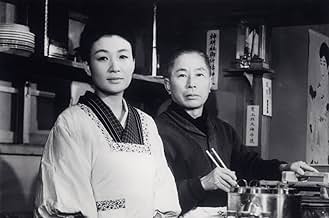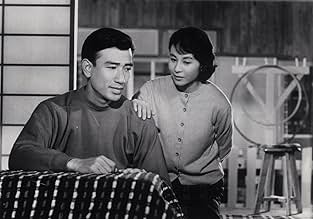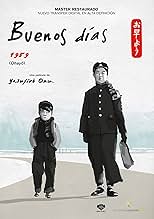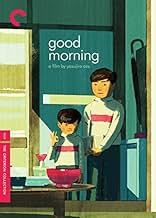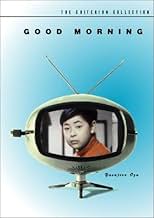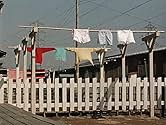VALUTAZIONE IMDb
7,8/10
11.875
LA TUA VALUTAZIONE
Due ragazzi iniziano uno sciopero del silenzio per spingere i genitori a comprare loro un televisore.Due ragazzi iniziano uno sciopero del silenzio per spingere i genitori a comprare loro un televisore.Due ragazzi iniziano uno sciopero del silenzio per spingere i genitori a comprare loro un televisore.
- Regia
- Sceneggiatura
- Star
Recensioni in evidenza
For viewers who have seen only one or two of Ozu's statelier films -- say, "Tokyo Story" or "Equinox Flower" -- "Good Morning" will be a surprise. Two children take a vow of silence to coerce their parents into buying a television set: that's pretty much the whole plot. But what happens as a result affects almost every aspect of life in the nondescript, gossipy, elbow-to-elbow suburb in which the boys' family lives.
This is a comedy, and like all good comedies it's very serious. The boys' act of rebellion is very un-Japanese, and it threatens many of the politely ritualistic social behaviors that mask and deflect the tensions in Japanese society. Whole alliances among the village's women teeter and threaten to topple. The family's authority structure is upended, with the all-powerful father crumbling against the stubborn silence of two little boys.
What wins in the end is love -- or rather (Ozu must have found this particularly funny) love and television. The resolution will probably tear you up (it has brought moisture to the eyes of everyone I've seen it with) but it represents enormous changes in Japanese society -- the collapse of patriarchal authority, the invasion of foreign culture, and especially English-language culture, and the inexorable rise of that great leveler of aesthetics, television. Ozu saw the future, and he wasn't in it.
So naturally, he presents all this in a gentle, even sweet-natured comedy. There may be greater Ozu films, but it's hard to think of one I actually like more than "Good Morning."
This is a comedy, and like all good comedies it's very serious. The boys' act of rebellion is very un-Japanese, and it threatens many of the politely ritualistic social behaviors that mask and deflect the tensions in Japanese society. Whole alliances among the village's women teeter and threaten to topple. The family's authority structure is upended, with the all-powerful father crumbling against the stubborn silence of two little boys.
What wins in the end is love -- or rather (Ozu must have found this particularly funny) love and television. The resolution will probably tear you up (it has brought moisture to the eyes of everyone I've seen it with) but it represents enormous changes in Japanese society -- the collapse of patriarchal authority, the invasion of foreign culture, and especially English-language culture, and the inexorable rise of that great leveler of aesthetics, television. Ozu saw the future, and he wasn't in it.
So naturally, he presents all this in a gentle, even sweet-natured comedy. There may be greater Ozu films, but it's hard to think of one I actually like more than "Good Morning."
It may have the skimpiest of plots--two young brothers take a vow of silence until their parents buy them a television--but Yasujiro Ozu's 1959 picture is anything but slight, taking on the subject of language (ironic, considering the story) with attentiveness and intelligence. In his deliberate, contemplative manner, Ozu presents a wry commentary on the ways even the most innocuous words can harm (gossip) or become the building blocks of a relationship (a budding romance is confirmed by a conversation about the weather); he also notes Japan's growing fascination with the English language (the older boy studies it) and the increasing obsession, now with fourteen years of distance from the war, with American technology--the suburban landscape is peppered with aerial antennas as television begins to permeate the culture. It's subtly beautiful: each shot is perfectly framed (the camera never moves) with an excellent use of depth that highlights exactly what the director wants you to see and giving you plenty of space to focus; it's easy to see how a master of today's Asian cinema such as Wong Kar-Wai would be profoundly influenced by Ozu's languid yet carefully observed filmmaking. A delight; it's also a fine introduction for younger viewers to the magnificence of international cinema.
Ozu's films always balance humour, heartbreak and social comment - in this film the balance is decidedly in favour of humour. Its hard to imagine a slighter story to build a full movie - two little boys who decide not to speak for a few days in a huff over being denied a TV. But Ozu builds a whole world out of this dull little suburb in a Japan just getting on its feet after the war and embracing consumerism as an alternative to..... well, whatever went before.
I think only Ozu could make boring mass produced housing look so utterly gorgeous in full colour, and the minor bickering of the household ladies seem so important. He's helped by a fantastic cast, especially the child actors playing the little boys (oddly enough, there doesn't seem to be any little girls in this suburb). The story has layer up layer of irony (aided by numerous fart jokes) built up upon its slight foundations making an utterly fascinating film. As usual with Ozu, he doesn't lecture, although as always his sympathy is slightly tilted to the somewhat bemused father figures. Even the simple ending, a shot of laundry fluttering on a line, seems somehow laden with meaning. The whole film is a pure delight.
I think only Ozu could make boring mass produced housing look so utterly gorgeous in full colour, and the minor bickering of the household ladies seem so important. He's helped by a fantastic cast, especially the child actors playing the little boys (oddly enough, there doesn't seem to be any little girls in this suburb). The story has layer up layer of irony (aided by numerous fart jokes) built up upon its slight foundations making an utterly fascinating film. As usual with Ozu, he doesn't lecture, although as always his sympathy is slightly tilted to the somewhat bemused father figures. Even the simple ending, a shot of laundry fluttering on a line, seems somehow laden with meaning. The whole film is a pure delight.
While somewhat lighter than most of Ozu's features, this is still a rather perceptive film that is also entertaining to watch. The situation and the characters are all straightforward, yet Ozu's expert eye sees plenty of things worth considering, and each simple story development has a purpose. If the material remains generally lightweight when compared to some of his other movies, it still has the same thoughtful, low-key touch and genuinely human characters.
The young boys drive much of the story in this one, and they are very believable, whether in their petulant responses to parental authority or in their schoolboy fads. Some of the latter can be slightly off-putting at times, but then such things do rather ring true with the nature of boys at that stage of their lives.
The cast is quite large, so that none of the characters gets a lot more screen time than any of the others, yet somehow all of them not only come alive, but get some defining moments. Most of the adult characters are simple, yet easy to care about, and there are several good performances. The grandmother character and the aunt of the two brothers are probably the most interesting of the characters, yet all of them have a purpose.
As is usually the case with Ozu's movies, you can watch it a second time and see additional detail in the characters' relationships and dialogue. This time, the issues involved are not as significant as usual, yet the simple plot provides some insights into the ways that families and neighbors communicate with one another and understand one another. It's probably more entertaining than enlightening, but yet there is some substance as well.
The young boys drive much of the story in this one, and they are very believable, whether in their petulant responses to parental authority or in their schoolboy fads. Some of the latter can be slightly off-putting at times, but then such things do rather ring true with the nature of boys at that stage of their lives.
The cast is quite large, so that none of the characters gets a lot more screen time than any of the others, yet somehow all of them not only come alive, but get some defining moments. Most of the adult characters are simple, yet easy to care about, and there are several good performances. The grandmother character and the aunt of the two brothers are probably the most interesting of the characters, yet all of them have a purpose.
As is usually the case with Ozu's movies, you can watch it a second time and see additional detail in the characters' relationships and dialogue. This time, the issues involved are not as significant as usual, yet the simple plot provides some insights into the ways that families and neighbors communicate with one another and understand one another. It's probably more entertaining than enlightening, but yet there is some substance as well.
In a small community of workers in Japan, two brothers decide to not speak because they want to force their parents to buy a television.
With this single storyline, Japanese director Yasujiro Ozu exposes a delightful and critical view of the behavior of the Japanese working class under the American influence in the post-WWII. Once again the major concern of Ozu is with the family and human relationship. The situation of the retired people is magnificently pictured through the desperate men looking for a job; the domination of the USA in Japan is represented through the need of private English classes for the two brothers, and the translation of documents to English; superfluous consume of the American society is represented through the importance of the useless television for the younger generation, while their parents are concerned with have some savings for their retirement. The destructive little gossips, the difficulties of communication, and many other problems of relationship are also shown in this little gem. For movie lovers like me, I regret to inform that this is the first DVD of the great director released in Brazil. Only in festivals, and occasionally in cable television, Brazilians have the chance to see the work of this great director. My vote is eight.
Title (Brazil): "Bom Dia" ("Good Morning")
With this single storyline, Japanese director Yasujiro Ozu exposes a delightful and critical view of the behavior of the Japanese working class under the American influence in the post-WWII. Once again the major concern of Ozu is with the family and human relationship. The situation of the retired people is magnificently pictured through the desperate men looking for a job; the domination of the USA in Japan is represented through the need of private English classes for the two brothers, and the translation of documents to English; superfluous consume of the American society is represented through the importance of the useless television for the younger generation, while their parents are concerned with have some savings for their retirement. The destructive little gossips, the difficulties of communication, and many other problems of relationship are also shown in this little gem. For movie lovers like me, I regret to inform that this is the first DVD of the great director released in Brazil. Only in festivals, and occasionally in cable television, Brazilians have the chance to see the work of this great director. My vote is eight.
Title (Brazil): "Bom Dia" ("Good Morning")
Lo sapevi?
- QuizYasujirô Ozu: [movie posters] Yasujirô Ozu pays tribute to his cinematic influences by putting all kinds of film posters all over the wall in his films. In this movie, there are two posters, one of La parete di fango (1958) (at 08:30) and one of Gli amanti (1958) (at 08:07), both at the neighbors' house.
- Versioni alternativeThe original American theatrical release prints were in black and white.
- ConnessioniFeatured in Transcendental Style and Flatulence (2017)
I più visti
Accedi per valutare e creare un elenco di titoli salvati per ottenere consigli personalizzati
- How long is Good Morning?Powered by Alexa
Dettagli
Contribuisci a questa pagina
Suggerisci una modifica o aggiungi i contenuti mancanti

Divario superiore
By what name was Buon giorno (1959) officially released in India in English?
Rispondi


